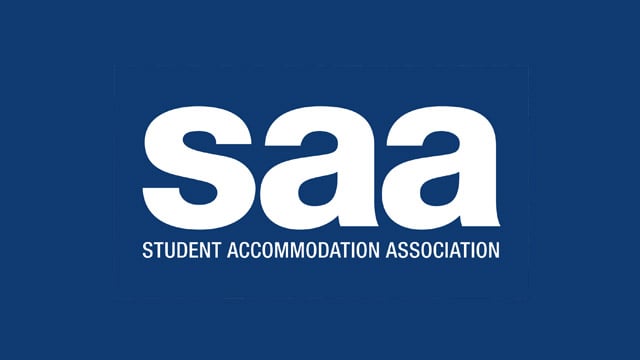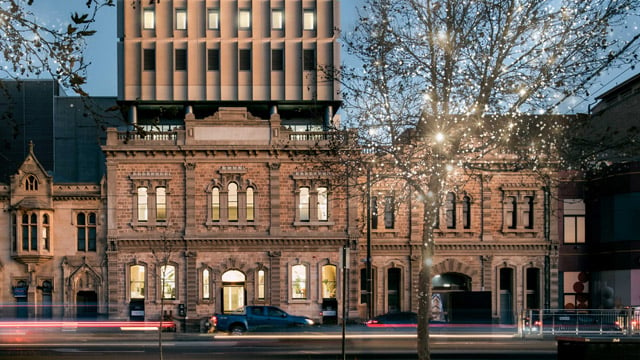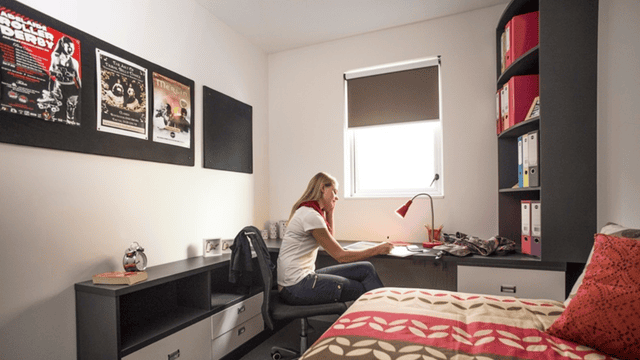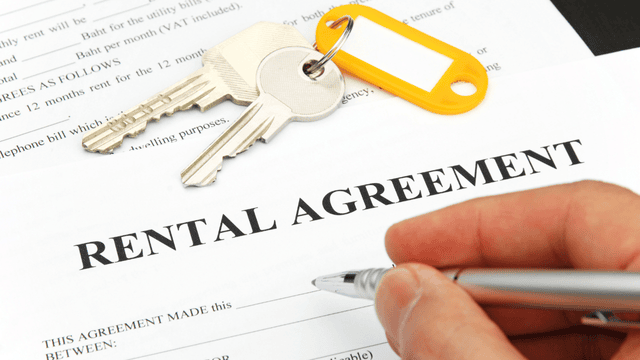Types of accommodation in Adelaide

There are five main types of accommodation options for international students, offering choices to suit all budgets and preferences.
Join Anshul, as he takes us through the different student accommodation options in Adelaide.
There are five main types of accommodation options for international students, offering choices to suit all budgets and preferences.
Residential colleges offer a blend of convenience and community for students. Typically located on or near campus, they provide easy access to classes.
What's typically included:
Fully furnished room on or near campus
Meals in the dining hall
Weekly room cleaning
Amenities (electricity, water, internet)
24-hour security
Student accommodations are often fully furnished and located off-campus, providing a balance of independence and community living.
Check out some of the student accommodation options in Adelaide.
What's typically included:
Fully furnished room or apartment
All-inclusive rent (covers bills and additional amenities like gym, cinema room, and spaces and events to socialise)
24-hour security
Different events and activities to socialise and make friends
Reception staff to help with any queries
High-speed internet
Renting a room in a shared house or apartment is often a more budget-friendly option. It also provides the opportunity to live with fellow students or locals, allowing for social interactions and shared responsibilities.
Flatmates is a peer-to-peer platform for finding shared accommodation. There are also Facebook groups to help find shared accommodation in Adelaide as well.
What's typically included:
Private bedroom
Shared living spaces (kitchen, living room, etc)
Parking space
Community living
Shared bills
For those seeking full independence, renting an entire apartment or house offers privacy, control over your space, and the freedom to choose your location.
A rental bond, usually a few weeks' rent, is often required as a security deposit.
Make sure to understand your rights and responsibilities as a tenant. For more information on private rentals, visit the South Australian Government website.
You can find rental properties in Adelaide on Domain or realestate.com.au.
What's typically included:
Your own private home
Choose your location
Ability to choose your own providers for electricity, internet, water, and gas
Private outdoor space
A homestay offers students the chance to live with a local family, providing cultural immersion, language practice, and included meals, all within a safe, vetted environment.
This cost-effective option can be arranged independently or through an agent.
The Australian Homestay Network is an agency that can help you find a homestay, and have partnered with many educational institutions in Adelaide.
What's typically included:
Cultural exchange benefits
Family environment
Language practice opportunities
Meals

StudyAdelaide is a proud supporter of the Student Accommodation Association (SAA), a national organisation that ensures quality student housing across Australia.
Look for SAA membership when choosing accommodation - these providers meet national quality standards through the accreditation scheme.
As one of Australia's most affordable cities, Adelaide offers students accommodation options to suit all budgets and preferences.
Adelaide’s CBD is the hub of student life, with easy access to student accommodations, cafes, restaurants and shopping spots within walking distance. For quieter or more affordable options, the inner suburbs like North Adelaide (near Adelaide University, Flinders University, and the city), Mile End, Unley, Bedford Park (near Flinders University), Mawson Lakes (near Adelaide University) and areas near TAFE SA’s Regency campus, such as Regency International House, provide peaceful residential areas with great transport links to the city centre.
Adelaide offers affordable student housing, but it's important to plan for all costs.
Accommodation options typically range from AUD $150 to $600 per week, with university housing and student accommodations often including bills in the rent. For private rentals, remember to budget extra for utilities and a rental bond (usually equivalent to 4 weeks’ rent).
Consider location too - living near campus saves on transport, while suburban homes offer lower rent but additional travel costs.
| Accommodation Type | Average weekly costs (AUD) | Average monthly costs (AUD) | Bills and amenities |
|---|---|---|---|
| Residential colleges | $550 | $2,200 |
All inclusive in rent + meals |
| Student accommodation | $350 | $1,400 | All inclusive in rent
|
| Renting a room | $200 | $800 | Generally not included
|
| Renting an entire place | $500 | $2,000 | Not included
|
| Homestay | $400 | $2,200 | All inclusive in rent + meals
|
Adelaide offers affordable student housing, but it's important to plan for all costs.
Accommodation options typically range from AUD $150 to $600 per week, with university housing and student accommodations often including bills in the rent. For private rentals, remember to budget extra for utilities and a rental bond (usually equivalent to 4 weeks’ rent).
Consider location too - living near campus saves on transport, while suburban homes offer lower rent but additional travel costs.
| Accommodation Type | Average weekly costs (AUD) | Average monthly costs (AUD) | Bills and amenities |
|---|---|---|---|
| Residential colleges | $550 | $2,200 |
All inclusive in rent + meals |
| Student accommodation | $350 | $1,400 | All inclusive in rent
|
| Renting a room | $200 | $800 | Generally not included
|
| Renting an entire place | $500 | $2,000 | Not included
|
| Homestay | $400 | $2,200 | All inclusive in rent + meals
|

As an international student tenant in Adelaide, you have the right to:
Visit the SA Government website or Rent Right SA to learn more about your rights and responsibilities as a tenant.
Remember, while you have these rights as a tenant, you also have responsibilities, including paying rent on time, keeping the property clean and reporting any damages promptly. Understanding your rights and responsibilities can help ensure a positive rental experience during your time studying in Adelaide.

Planning ahead can make applying for accommodation in Adelaide a straightforward process. Start researching and applying as early as possible - ideally a few months before your move. This gives you the best chance of securing your preferred option.
Here's what you'll need:
Essential documents
Your passport
Proof of enrollment
Financial documents
Visa details
Pay attention to details by completing your application fully, understanding any fees and keeping copies of all correspondence. Be aware of common mistakes, such as overlooking additional costs or not thoroughly reading the lease agreement.

If you ever need assistance regarding private rentals or accommodation in Adelaide, you should first contact your institution.
For additional support:
Support services, you can get free help with:
Rental advice: Residential Tenancies (13 18 82)
Legal assistance: Community Legal Services (08 8342 1800)
Language support: TIS National (13 14 50)
Housing advice and advocacy: RentRight SA (1800 060 462)
If you find yourself without accommodation, contact:
Homeless Connect SA (1800 003 308)
The average weekly cost of student accommodation in Adelaide is between AUD $300 - $600 per week.
The all-inclusive rent typically covers bills and may include additional amenities like gyms or common areas for socialising.
Choosing the right accommodation location in Adelaide is a key part of your student experience.
The city offers a vibrant lifestyle with a variety of options, from the bustling City Centre, close to everything you need, including cafes, restaurants, and student accommodations, to quieter, more affordable suburbs like North Adelaide (near Adelaide University, Flinders University, and the city), Bedford Park (near Flinders University), Mawson Lakes (near Adelaide University), Unley, and Mile End. These areas are well-connected by reliable public transport, making it easy to get around.
Whether you prefer the convenience of being close to campus or the peace of a student-friendly suburb, Adelaide caters to all budgets and preferences, making it one of Australia's most affordable cities for students.
These typically include identification (such as your passport), proof of enrollment, and sometimes financial documentation to confirm you can meet rental or accommodation fees. Having these documents ready will streamline your application and prevent delays.
University accommodation, student accommodation, and homestays can be arranged before arrival.
However, for private rentals, in-person inspection is typically required, so you may need to book short-term accommodation like a hotel or Airbnb for when you first arrive.
Additional costs may include utilities (electricity, water, internet), a rental bond (security deposit), laundry, and any campus-specific fees or charges. It's important to ask about these upfront to avoid surprises.
Always thoroughly read the lease, including the duration, rent payments, additional costs and terms regarding bond refunds.
If unsure, seek advice from legal or housing support services.
Changing accommodation may be possible but you will need to consider the terms of your current contract or lease. Check if there are any break clauses or options to transfer to another room or property.
Consider your budget, proximity to your university, public transport options and what amenities are important to you (e.g., laundry facilities, internet).
Start early, be prepared with your documents and don’t hesitate to seek help from the university or StudyAdelaide.